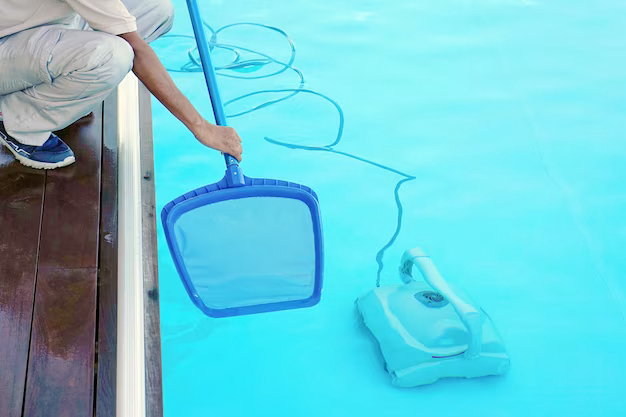Comprehensive Guide to Pool Heater Repair
Ah, the tranquility of a warm pool on a cold day! But what happens when your pool heater decides to go on a break? That’s where we step in. Let’s dive into the ins and outs of pool heater repair.
Why Do Pool Heaters Break Down?
Just like any other piece of machinery, pool heaters can wear out. But why?
- Age: The longer a pool heater runs, the more wear and tear it undergoes.
- Improper Maintenance: Skipping routine checks can escalate minor issues.
- External Factors: Weather, debris, and even pests can cause damage.
Recognizing Signs of a Malfunctioning Pool Heater
Ever had that inkling something might be off? Here’s what to look for:
- Unusual Noises: Whining, banging, or hissing can hint at internal problems;
- Insufficient Heating: If it’s taking longer to heat or not heating at all;
- Visible Damage: Leaks, rust, or cracks are glaring red flags.
Types of Pool Heaters
Ever wonder what’s under the hood? Let’s dissect the common types of pool heaters.
Gas Pool Heaters
Fueled by natural gas or propane, they’re ideal for quick heating.
Common Problems:
- Pilot Light Outages: Often caused by a gust of wind or a malfunctioning thermocouple;
- Corroded Pipes: Saltwater pools can lead to corrosion if not properly maintained.
Electric Pool Heaters
Popular due to their efficiency. They pull in surrounding air to heat the pool.
Common Issues:
- Faulty Thermostats: This can cause the heater to run non-stop;
- Blocked Evaporators: Dust and debris can clog the system.
Solar Pool Heaters
Eco-friendly and cost-effective. They utilize solar panels to generate heat.
Common Hiccups:
- Inefficient Heating on Cloudy Days: They rely heavily on sunny weather;
- Worn-out Panels: Over time, panels can degrade, reducing their efficiency.

DIY Quick Fixes
Before calling in the cavalry, consider these DIY fixes:
- Thermostat Settings: Ensure it’s set to the desired temperature;
- Circuit Breakers: A tripped breaker might be the culprit;
- Clean Filters: A clogged filter can impede water flow.
When to Call a Professional
Sometimes, it’s best to leave things to the experts. If you notice:
- Persistent Issues: Despite troubleshooting, the problem persists;
- Complex Repairs: Internal repairs or replacements are better left to professionals;
- Safety Concerns: Gas leaks or electrical issues warrant immediate professional attention.
Cost of Repairs
Is the repair worth it, or should you consider a replacement?
| Issue | Average Cost |
|---|---|
| Thermostat Replacement | $50-$200 |
| Heat Exchanger Repair | $500-$1,200 |
| Complete Heater Replacement | $1,500-$4,000 |
Preventive Maintenance
Prevention, as they say, is better than cure.
- Regular Check-ups: At least twice a year;
- Covering the Heater: Protect it from adverse weather conditions;
- Flush Out the System: It helps clear blockages and build-ups.
The Importance of Water Chemistry in Pool Heater Health
Maintaining your pool’s water chemistry doesn’t only affect the swimmers’ safety and enjoyment. It plays a pivotal role in the longevity and functionality of your pool heater. A balanced chemical composition ensures optimal performance and reduces undue wear and tear.
Corrosion and Calcification Issues
When water chemistry is off, especially if the water becomes too acidic, it can lead to corrosion in the pool heater’s metal components. On the other side of the spectrum, overly alkaline water can result in calcification, where calcium deposits build up in the system, inhibiting water flow and reducing heating efficiency.
The Role of Salt in Saltwater Pools
For those with saltwater pools, it’s crucial to understand that the salt itself can be corrosive over time. If not adequately managed, it can cause erosion in certain parts of your heater, especially if they’re made of materials susceptible to salt damage. Regularly checking and adjusting your pool’s salinity can help in preventing undue damage.
Energy Efficiency and Pool Heaters
In the age of environmental consciousness, energy efficiency is more than just a buzzword. It’s a standard that many homeowners aspire to, even when it comes to pool heaters.
Upgrading to Energy-Efficient Models
Modern pool heaters are designed with efficiency in mind. Over the years, technology has progressed, leading to heaters that consume less energy while delivering optimal results. Upgrading to a newer model can not only reduce your monthly bills but also your carbon footprint.
The Impact of Regular Maintenance
A well-maintained pool heater doesn’t just function correctly—it operates more efficiently. Cleaning out blockages, ensuring optimal water flow, and regular checks can help your heater run at its most energy-efficient state.

The Future of Pool Heaters
As with all technological sectors, pool heating is ever-evolving. As homeowners become more tech-savvy and environmentally conscious, the demand for smarter, greener heating solutions is rising.
Integration with Smart Homes
In the era of smart homes, integration is key. Future pool heaters are likely to be more seamlessly integrated into home automation systems. Imagine adjusting your pool’s temperature via voice commands or getting maintenance alerts on your smartphone!
Solar and Sustainable Options
As the world shifts toward sustainable energy, pool heaters are not left behind. While solar pool heaters have been around, further innovation might see more efficient, compact, and affordable solar options. Harnessing renewable energy sources beyond just solar, like wind or geothermal energy, could also be on the horizon.
Safety Protocols for Pool Heater Maintenance
When diving into pool heater maintenance, safety can’t be stressed enough. The mixture of water and electricity or gas can pose serious risks if not handled correctly.
Tools and Preparation
Before you even begin, ensure that you have the right tools for the job. Not only does this make the task easier, but it also ensures you can perform the job safely.
- Gloves: For protection against chemicals and hot components;
- Insulated Tools: Especially if working around electrical components;
- Safety Goggles: To protect against splashes or sparks.
Electric Heater Safety
With electric heaters, a prime concern is the risk of electric shock. Always:
- Turn off the power source before starting any repair or maintenance;
- Avoid touching wires or terminals with bare hands;
- Check for any visible wear and tear on the wiring, as this can pose a fire hazard.
Gas Heater Safety
Gas heaters come with their unique set of challenges, primarily the risk of gas leaks.
- Regularly check for any gas smell around the heater;
- Ensure proper ventilation around the heater to prevent the buildup of gas;
- If you suspect a leak, shut off the gas supply immediately and call a professional.
The Relationship Between Pool Size and Heater Capacity
Your pool’s size plays a significant role in the type of heater you should choose. A heater too small might not be efficient, while an overly large one could lead to unnecessary costs.
Calculating Pool Volume
Firstly, it’s crucial to determine your pool’s volume. Here’s a simple guide:
- Rectangular Pools: Length x Width x Depth;
- Circular Pools: 3.14 x Radius^2 x Depth.
Heater Capacity Guide
| Pool Size (in gallons) | Recommended Heater Size (BTUs) |
|---|---|
| Up to 10,000 | 50,000 – 100,000 |
| 10,001 – 20,000 | 100,000 – 150,000 |
| 20,001 – 30,000 | 150,000 – 200,000 |
| 30,001 and above | 200,000 and above |
Innovative Accessories for Pool Heaters
Today’s market is not just about the pool heaters themselves but also the plethora of accessories that can enhance functionality, efficiency, and safety.
Smart Thermostats
Modern thermostats offer remote control, allowing users to adjust pool temperatures from the comfort of their living room or even when they’re away from home.
Energy-Efficient Covers
These covers are designed to trap heat, reducing the time and energy needed to warm your pool. They come in various styles, such as:
- Solar bubble covers;
- Thermal pool blankets;
- Automatic pool covers.
Anti-Corrosion Anodes
A simple yet effective accessory, these anodes counteract the corrosive effects of salt and chemicals, extending the lifespan of your pool heater.

Winterizing Your Pool Heater
As winter approaches, ensuring your pool heater is well-prepared is crucial for its longevity and optimal performance during the next season.
Steps to Winterize Your Pool Heater
- Shut Off the Power: Whether it’s gas or electricity, always turn it off first;
- Drain the Water: Remaining water can freeze and cause damage;
- Clean and Inspect: Look for any wear or damage that might need attention before the next swim season;
- Cover the Heater: Protect it from winter elements using a weatherproof cover;
- Store Accessories: Remove and store any external accessories to prevent them from winter damage.
Deciphering Common Pool Heater Sounds
The hum of a working pool heater is a comforting sound to many homeowners, indicating that warm, inviting waters await. But when that hum turns into a clatter, buzz, or whistle, it’s essential to know what these noises might indicate.
The Buzzing or Whistling Heater
A faint buzz from your pool heater is generally considered normal, especially when it starts up. However, a pronounced buzzing or a whistling sound could be a sign of an airflow issue. The heater’s fans or blowers might be clogged with debris, or there might be a problem with the fan motor itself. Regular maintenance and ensuring that the area around the heater is free of debris can often prevent these issues.
The Loud Clattering or Rattling
If you’re hearing these noises, it’s usually not a great sign. Often, this indicates a mechanical problem, such as a loose part inside the heater. It might be as simple as a screw that’s come undone, but it could also point to a more severe issue, like a malfunctioning component that needs replacement. Don’t ignore these sounds; the longer you wait, the higher the potential repair costs.
Conclusion
While pool heater repairs can seem daunting, understanding the basics can make the process smoother. Whether you’re troubleshooting minor issues or considering professional help, being informed is your best defense against the cold!
Frequently Asked Questions
On average, 10-15 years with proper maintenance.
While possible, it’s recommended to have a professional installation to ensure safety and efficiency.
They can be less efficient due to fewer sunny days but can still provide some level of heating.
At least once a year, ideally before the start of the swimming season.
It’s possible, but given the costs and complexities, replacements are often more feasible.









